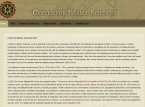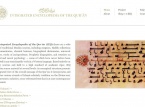Tags (2) : Center for Islamic Sciences
Center for Islamic Sciences (CIS) is dedicated to the promotion of research and diffusion of knowledge on all aspects of Islam. CIS encourages a creative exploration of natural and human sciences from the Islamic worldview, critical integration of contemporary disciplines into the framework of traditional Islamic thought and learning, and a renewed and rigorous link with the intellectual tradition of Islam. CIS supports activities aimed at enhancing our religious and scientific understanding of nature and the human condition. The Center recognizes an underlying unity of all branches of knowledge as stemming from and anchored in Unicity of God (tawhid), the most fundamental principle of Islamic ontology and epistemology. Seen from this perspective, the entire manifest world, from the lowest to the highest levels, is recognized as an integrated and interconnected system. CIS recognizes this cosmic hierarchical structure, with its underlying unifying principle of tawhid, and operates within the epistemological framework of the Qur’an.
Tags :
Center for Islamic Sciences
In 2007, the Center for Islamic Sciences (CIS) initiated the Qur'an encyclopedia project. The seven-volume Integrated Encyclopedia of the Qurʾān (IEQ) is envisioned as a scholarly reference work, providing comprehensive and authoritative articles on all concepts, persons, events, things, and places mentioned in the Qurʾān. IEQ draws on a wide range of traditional Muslim sources, including exegeses, Hadith collections and commentaries, classical lexicons, biographical dictionaries, universal histories, works of jurisprudence, Prophetic biographies, and treatises on spiritual and moral psychology—some of which have never before been presented in any encyclopedic work in a Western language. Based entirely on primary sources and held to a high standard of academic rigor, IEQ integrates source material at several levels: its conceptual structure presents an integrated view of the overall message of the Qurʾān; it incorporates and integrates various strands of Islamic scholarly tradition on the Divine text; and presents a cohesive, cross-referenced text that is at once contemporary and classical. The first volume was published in January 2013. For details see the dedicated website for the project www.iequran.com.
|
Les Cahiers de l'Islam © 2012-2023. Tous droits réservés.
ISSN 2269-1995 Contact : redaction (at) lescahiersdelislam.fr |













